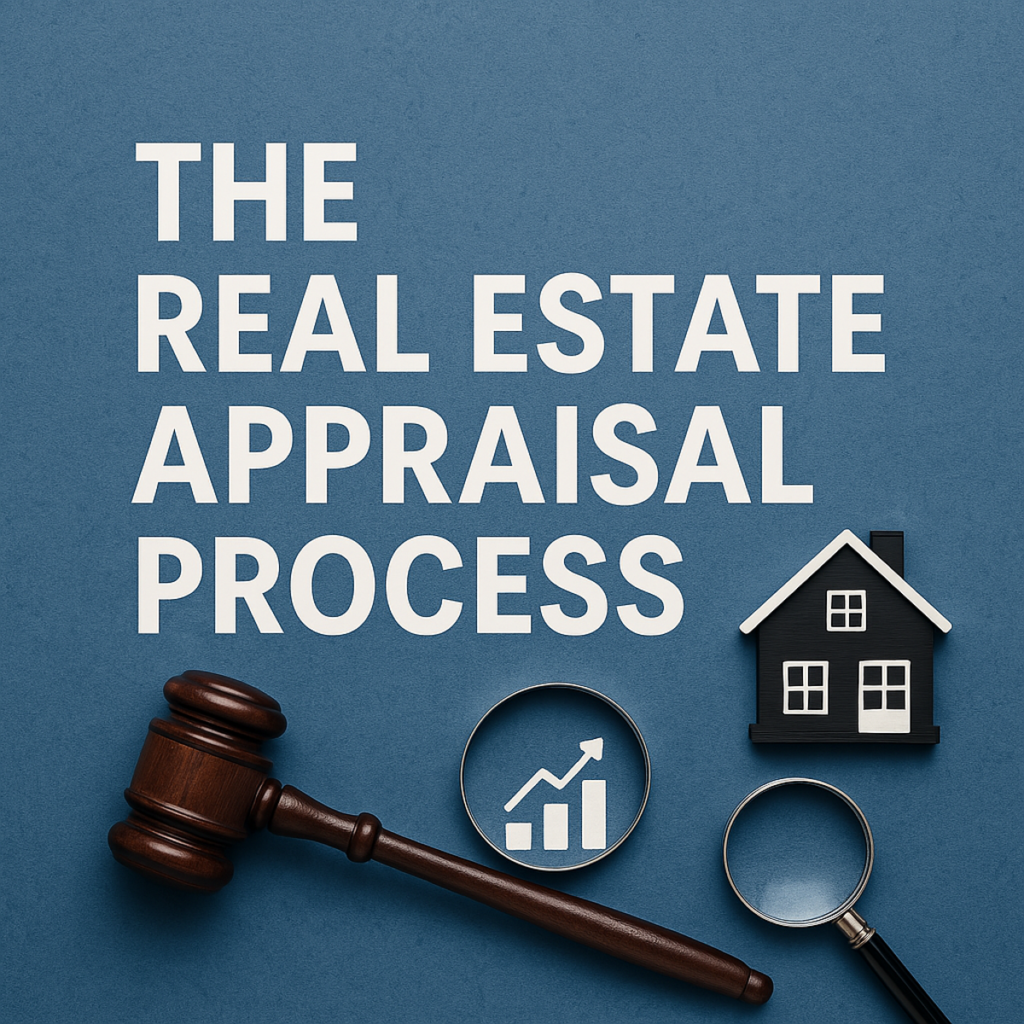Many assume the real estate appraisal process is an exact science, but it’s far from perfect. In reality, appraisals are based on an individual appraiser’s interpretation of market data, which isn’t always as precise as buyers and sellers might hope and can arrive at a higher or lower home value.
How the Real Estate Appraisal Process Works

Appraisals are one of the biggest wild cards in a real estate transaction. While most sellers and agents focus on a buyer’s financing strength, few consider how the lender selects an appraiser and what that means for the deal.
While the real estate appraisal process serves an important role in the lending process, their accuracy can vary depending on who conducts the appraisal, how familiar they are with the local market, and the process by which they were assigned. In some cases, a poorly matched appraiser can create unnecessary roadblocks—even when the agreed purchase price is fully supported by market conditions.
This real estate appraisal process isn’t as straightforward as many assume. A lender’s approach—whether they use a dedicated appraiser panel or an Appraisal Management Company (AMC)—can significantly impact whether a deal moves forward smoothly or gets derailed by a questionable appraisal.
Why Lender Selection Matters
Lenders don’t pick appraisers directly. Instead, they rely on one of two methods:
1. Lender’s In-House Appraisal Panel
- Some lenders maintain a trusted network of appraisers they regularly work with.
- These appraisers are more likely to understand local trends, unique properties, and current market conditions rather than just relying on outdated comps.
- If an issue arises—such as a unique property or limited comps—the lender’s relationship with these appraisers can help ensure a more accurate, well-supported valuation. Appraisers who have a personal relationship with the lender may be more flexible in interpreting home or property value, as they may feel more comfortable discussing market nuances or requesting more information. This could lead to better collaboration if the appraiser encounters something outside their typical scope of work
2. Appraisal Management Company (AMC)
- Many lenders outsource to an Appraisal Management Company (AMC), which selects appraisers from a pool based on licensing, location, and availability.
- While AMCs try to make reasonable assignments, they don’t always prioritize market familiarity, which increases the risk of inaccurate or outdated valuations.
- Regional AMCs and Local Networks: Many AMCs have strong networks of appraisers within a given area. If an AMC operates in Central Oregon, they are likely to have local appraisers on their panel who are familiar with the market and property types in the region. So, while there’s always a chance that a new or less experienced appraiser could be assigned, the AMC’s familiarity with the area often mitigates this.
- The AMC takes a cut of the appraisal fee, meaning the appraiser earns less than they would if hired directly. This can lead to:
- Rushed appraisals with minimal market analysis.
- A “check-the-box” approach rather than a deep dive into unique property features.
- Errors or inconsistencies that rarely get challenged since Reconsiderations of Value (ROVs) are almost never granted unless there’s a blatant mistake.
Why the Real Estate Appraisal Process Matters for Sellers: Key Insights & Tips
The appraised value of a property or home impacts the buyer’s ability to get financing. If an appraisal comes in lower than expected, the buyer may need to make up the difference out of pocket, renegotiate terms with seller or risk the deal falling apart.
The lender’s approach can heavily influence the real estate appraisal process, especially with unique or niche properties. Out-of-area lenders, particularly those using an appraisal management company (AMC), can create a disconnect. These AMCs often assign appraisers who may not be familiar with the local market or the property’s distinctive characteristics, which can lead to undervaluation or misinterpretation of the property’s worth.
For example, appraisers unfamiliar with resort areas like Sunriver might overlook unique aspects that add value, such as access to exclusive amenities or specific features that are highly valued in that area but may not be immediately apparent in a standard appraisal.
A local lender who works with trusted appraisers familiar with the area is far more likely to produce an accurate appraisal, which can help prevent delays or complications in the transaction. It’s something that sellers should definitely be aware of when reviewing offers and negotiating terms.
Challenges in the Real Estate Appraisal Process: Common Mistakes & Their Impact
While appraisers are licensed professionals, they are not infallible experts. Their reports are subject to:
- Limited Data Interpretation – Appraisers rely heavily on recent closed sales, but market trends shift faster than public records update. If they aren’t fully in tune with current demand, their valuation may lag behind the real market.
- In markets like Central Oregon, where properties might not fit neatly into typical comps, or there’s a scarcity of comparable sales (especially for niche or high-end homes), appraisers can default to a more formulaic approach that doesn’t reflect the true market value. This is especially problematic when properties are unique, like resort homes, land with limited comps, or homes with high custom value that doesn’t show up in the standard comps.
- Subjectivity & Bias – Two appraisers evaluating the same home can arrive at vastly different values based on which comps they choose and how they adjust for differences.
- Over-Reliance on Historical Data – In fast-moving markets, appraisers often misprice homes because past sales haven’t yet caught up with rising demand.
- Errors & Omissions – Mistakes happen more often than people realize, but getting an ROV is extremely difficult unless the appraiser makes a clear factual error (e.g., misreporting square footage).
- Fee Cuts and Appraisal Quality: If an AMC is taking a large cut, the appraiser might be paid less than if they were working directly with the lender. In some cases, appraisers could feel the need to work faster or take on more assignments, potentially impacting the quality of the report, especially in complex cases. It could create a situation where appraisers feel incentivized to produce more appraisals in a shorter period of time, possibly sacrificing thoroughness.
- Incentive for Appraisers to Maintain Relationships: If an AMC takes a cut of the appraisal fee, appraisers might feel an additional incentive to keep the lender or AMC’s rep happy, especially if they rely on that stream of work. This could lead to a stronger incentive for the appraiser to align with what the lender or AMC expects from the appraisal, or at least deliver an appraisal that’s more likely to be accepted. Appraisers may be more inclined to give the lender or AMC a favorable report to ensure they get future work.
- Pressure to Get It Right: This dynamic could be a double-edged sword. On one hand, appraisers might work harder to deliver a quality, accurate report to maintain their relationship with the lender and AMC, which could reduce the chances of errors or mistakes. On the other hand, the additional financial pressure could lead some appraisers to rush or focus more on what they believe the lender wants to see, rather than taking the time to fully assess the nuances of a more complex property.
- Risk of Conflict of Interest: Having personal relationships and financial incentives tied up between the lender, the AMC, and the appraisers can sometimes create conflicts of interest. This can be a concern if an appraiser is motivated to deliver a valuation that benefits the lender or AMC rather than providing an objective assessment of the property.
- Perception of Collusion: Sellers or agents might perceive that the appraiser is too closely tied to the lender, raising concerns that the appraisal is influenced by that relationship, even if that’s not necessarily the case. This perception of collusion could hurt the reputation of the lender or AMC, especially if issues arise in the appraisal.
Why Do Appraisals Often Match the Contract Price?
One of the most common patterns in real estate is how often appraisals land exactly at the contract price—not higher, not lower. Why?
- The Contract Price Serves as a Psychological Anchor
- Even though appraisers are independent, knowing the purchase price subconsciously influences their valuation.
- Market Data Usually Supports It
- If buyers and sellers negotiated based on available comps, the appraiser can usually find enough data to justify the price.
- Lender & AMC Incentives
- Since appraisers working through AMCs make less money per report, they have less motivation to challenge values unless absolutely necessary.
- Incentive for Appraisers to Maintain Relationships: If an AMC takes a cut of the appraisal fee, appraisers might feel an additional incentive to keep the lender or AMC’s rep happy, especially if they rely on that stream of work. This could lead to a stronger incentive for the appraiser to align with what the lender or AMC expects from the appraisal, or at least deliver an appraisal that’s more likely to be accepted. Appraisers may be more inclined to give the lender or AMC a favorable report to ensure they get future work.
- Avoiding Pushback & Extra Work
- If an appraisal comes in too high, the lender may question it. If it’s too low, it could trigger disputes or an ROV request. Many appraisers choose the path of least resistance—validating the contract price rather than rocking the boat.
- At the end of the day, appraisals are done to protect the lender, not necessarily to provide an exact reflection of market value.
- Lenders want assurance that the home is worth at least what they’re lending, and if the contract price falls within a reasonable range, the appraiser may simply confirm that rather than making waves.
- Most appraisers aren’t intentionally inflating values or “cheating,” but the system itself is designed in a way that nudges values toward the contract price when possible. There’s a mix of market reality, lender expectations, and human psychology at play. However, when a property is truly mispriced or doesn’t support the contract price with solid comps, that’s when you see appraisals coming in below value.
The Reality: Appraisals Are Just One Opinion—And Often Less Reliable Than Market-Driven Pricing
It’s important to remember that an appraisal does not define a property’s true market value—it’s simply one individual’s interpretation of available data.
- The best measure of value is what a willing buyer and seller agree to in an open market.
- A seasoned real estate agent—who works in the market daily—is often better equipped to assess a property’s worth than an appraiser who may only visit the area occasionally.
- If an appraisal undervalues a home, it doesn’t mean the home isn’t worth the contract price—it just means the appraiser couldn’t justify it within their framework.
The Bottom Line on the Real Estate Appraisal Process
For sellers and agents, understanding the buyer’s lender isn’t just about financial qualifications—it’s about how that lender approaches the real estate appraisal process and is key to avoiding unnecessary issues. If a deal involves a unique property, tight comps, or market fluctuations, the right appraiser can mean the difference between closing smoothly or an unnecessary appraisal dispute.
Knowing about the buyer’s lender’s approach to the real estate appraisal process is key to avoiding unnecessary issues. Before accepting an offer, consider:
Does the lender use a trusted appraiser panel or an AMC and how are appraisers selected for assignments?
If an issue arises, how likely is the lender to work toward a solution?
While you can’t directly control who the appraiser is, you can help guide the real estate appraisal process by sharing your local market knowledge with the buyer’s agent and asking them to advocate for the right appraiser. Pushing for a local appraiser via local lender with specific experience in local unique property types (like resort or vacation homes) is one of the best ways to ensure a more accurate valuation.
Appraisals can help justify home value, but they are not the final say—and certainly not more authoritative than an experienced agent’s analysis or the buyer and seller’s own judgment.
Real Estate Appraisal Process FAQ
General FAQs about The Real Estate Appraisal Process
Q: What affects a home appraisal the most?
A home appraisal is influenced by market conditions, recent comparable sales, the appraiser’s local experience, and lender assignment methods.
Q: Can a seller challenge a low appraisal?
Yes, but reconsideration requests (ROVs) are rarely successful unless there is a factual error.
Q: How can I avoid a bad appraisal?
Working with a lender who uses local, experienced appraisers can help prevent valuation issues.
Why Do Appraisals Often Match the Contract Price?
Q: Why do home appraisals frequently match the purchase price?
A: Appraisers often use the contract price as a benchmark. If the agreed price falls within a reasonable market range, they may justify the value based on available comps rather than challenge it.
Q: Are appraisers influenced by the contract price?
A: While appraisers are independent, knowing the contract price can act as an anchor, subtly influencing their valuation choices and comp selection.
Q: Does lender pressure affect appraisal values?
A: In some cases, appraisers working through Appraisal Management Companies (AMCs) may feel indirect pressure to align with lender expectations, leading to valuations that validate the contract price.
Q: Can a home appraise for more than the contract price?
A: Yes, but it’s uncommon. Many lenders and AMCs prefer appraisals to align with the purchase price to avoid complications or underwriting concerns.
Q: What happens if an appraisal comes in lower than the contract price?
A: If an appraisal is lower than expected, buyers may need to renegotiate, bring extra cash, or challenge the valuation through a reconsideration of value (ROV), though ROV approvals are rare.
About The Author

Sunriver Homes For Sale
Your Sunriver Escape Awaits! 🌲🏡 Whether you’re searching for an established nightly rental, a forever home, a dream vacation retreat, or a second home investment property, Sunriver offers it all—stunning natural beauty, endless outdoor adventures, and a thriving resort community.
🔥 Sunriver homes go fast—don’t miss your chance!


